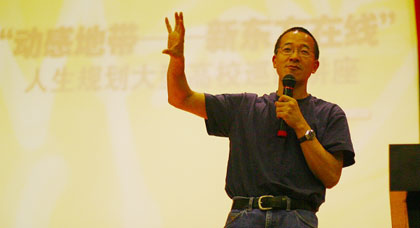Yu Minhong: from failure to success
By Lu Hongyan (chinadaily.com.cn)Updated: 2006-11-24 16:17
 Yu Minhong gives a lectures in this undated file photo.  |
Almost every university student in China who wants to go abroad knows Yu Minhong's name.
Nicknamed the "godfather for overseas study," Yu is often greeted on the street in the US or Canada by Chinese students. Having such a recognizable face is largely due to the popularity of the Beijing-based New Oriental Education Group, which offers intensive training for students planning to go abroad for TOEFL and GRE exams. The 44-year-old Yu serves as the chairman.
Despite his enormous success, Yu looks the same as before he made it big,
dressing casually in pants and white sneakers. But "I failed many times before
my current success," he says.
 Yu Minhong |
But his acceptance into Peking University was not the end of his academic troubles. In the beginning, Yu was placed in a class for sub-standard students, because he couldn't speak standard Chinese. In his junior year, he caught pneumonia and had to take a year off from his studies. These experiences caused his classmates to look down on him for being what they saw as a poor student, which affected his social life. "Not a single girl fell in love with me during my five years in university," he says.
After graduating from Peking University in 1985, Yu became a teacher there. "I was proud because the university was so famous," he says.
Since most of his former classmates went abroad, Yu began to apply to study
at American universities. Finally, after three years, he was accepted by a
university and given financial aid.
In order to earn enough money to
study abroad, he and several other former classmates taught other students how
to pass the TOEFL exam in a class run outside of Peking University.
However, Peking University officials considered this class irrelevant to his
job, disciplined him, and announced the results of his punishment over the
campus radio station. In 1991, after working there for six years, Yu quitted
Peking University in disgrace.
Yu negotiated with Oriental University
where he had taught English in his spare time to set up an English training
department affiliated with the university. The university approved his plan on
the condition that he paid 15 per cent of the earnings to the department.
Yu and his wife rented space in a primary school in Zhongguancun in the western suburbs of Beijing to enroll students. Even though the school was affiliated with a big name university, the classroom conditions were shabby and there were only two staff members. Few students enrolled.
So Yu began to give free lectures to lure people interested in studying
abroad to his class. His lectures were popular, and soon many students enrolled
in his class. Yu's English training department quickly became well known
throughout Beijing, and in 1993 he decided to open his own private
school.
Since the government only allows retirees or those holding
associate professorships or higher academic titles to legally represent private
schools, at first the Haidan District Education Bureau in Beijing refused to
certify Yu. But Yu's persistence, coupled with the popularity of his English
Training Department, persuaded the bureau to temporarily certify him, after
which he set up the New Oriental School in the western suburbs of Beijing in
1993. Within one year he had earned enough money to study abroad.
"But I was reluctant to leave the school as it had more than 2,000 students. I found it a promising career as the number of students was constantly increasing," Yu recalls.
To expand the school, Yu traveled to the United States and Canada to persuade his former teachers and classmates to join.
The move proved positive. The New Oriental Education Group now has nearly 30
English-training schools in different parts of the country. The expansion
happened so fast that it caught Yu by surprise.
"At times I'm exhausted
by the workload and want to close the schools down," he says. "But I'm
responsible for 4,000 employees."
|
||
|
||
|
|